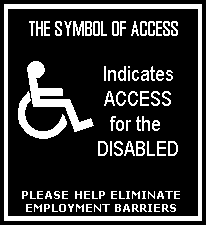|

Assistive Technology
The
National Institute on Disability and Rehabilitation Research
Public Meeting on Assistive Technology, held at Arlington,
Virginia, January 15, 1998
- Members of the Listening Panel:
- Judith E. Heumann, Assistant Secretary for the Office of
Special Education and Rehabilitative Services
- Howard R. Moses, Deputy Assistant Secretary Office of
Special Education and Rehabilitative Services
- Thomas F. Hehir, Director of the Office of Special
Education Programs
- Fredric K. Schroeder, Commission of the Rehabilitation
Services Administration
- Katherine D. Seelman, Director of the National Institute
on Disability and Rehabilitation Research, Chair of Meeting
-
- Comments by Rex A. Hoover, Panelist -
Business/Marketing/Technology Transfer
-
I'm Rex Hoover, the President of the TriTek Corporation
located in Northern Virginia.
-
I believe the issues being addressed here are important
and need to be focused on but there is another issue that
must be addressed or the vision of the Americans with
Disabilities Act will never be realized --- That issue is
access to intellectually challenging careers.
-
The ADA Handbook Preamble states --- "Enactment of
the ADA reflects deeply held American ideals which treasure
the contributions which individuals can make when free from
arbitrary, unjust, or outmoded societal attitudes and
practices that prevent the realization of their potential.
The ADA reflects a recognition that the surest path to
America's continued vitality, strength and vibrancy is
through the full realization of the contributions of all its
citizens."
-
Those words describe an extraordinary vision, a vision
that I personally have committed my support to help become
reality but there is a key stuck in the lock and until it
can be turned, the door that represents access to high-tech
careers for tens of thousands of people with disabilities
will remain closed.
-
With the current state-of-the-art in personal computer
technology, one can design an interface so that anyone who
can operate a personal computer can operate equipment
connected to it. For example, my family, using our own
funds, have developed an optical microscope that a person
with no limb mobility can operate as productively as anyone
else, and twice as productively as people that use
conventional microscopes today. And, we wrote a course to
train people with mobility impairments so they could compete
for jobs as quality assurance inspectors in places such as
the Dominion Semiconductor or Lockheed Martin plants in
Manassas. The Woodrow Wilson Rehabilitation Center purchased
2 of our systems along with the course we wrote and has
trained 8 people since the fourth quarter of 1996. Since
then, neither one of the Manassas plants has shown any
interest in hiring the graduates while Virginia
Semiconductor in Fredericksburg has. A relatively small
company, with enlightened leadership, has demonstrated
acceptance of the principles set forth in the ADA preamble,
while the largest Government contractor in the United
States, and a company that was given very generous tax
breaks to locate in the Commonwealth, has hired people to
fill jobs that could have been filled by graduates of the
Woodrow Wilson Rehabilitation Center program.
-
This is the problem that must be solved, the problem of
acceptance by large companies of the vision described in
that ADA preamble. Solving this problem, also solves the
problems of getting new assistive technology developed and
getting people access to it. Companies need trained workers
and once they accept that the population of people with
disabilities are a valuable source for the mission-critical
staffing they need, they will provide the assistive
technology for the same reason they provide employees
telephones, FAX machines and personal computers; because
these tools enable people they employ to provide a product
or service at a profit. If there is a market for more
sophisticated enabling devices, developers will spend their
own funds inventing this new and better assistive
technology. Everyone wins --- but first, we have to find a
way to convince the people that make the hiring decisions
that employing people with disabilities is the best thing
for their business operations. I'm asking that this body add
this as an issue to be addressed.
-
Thank you.
|